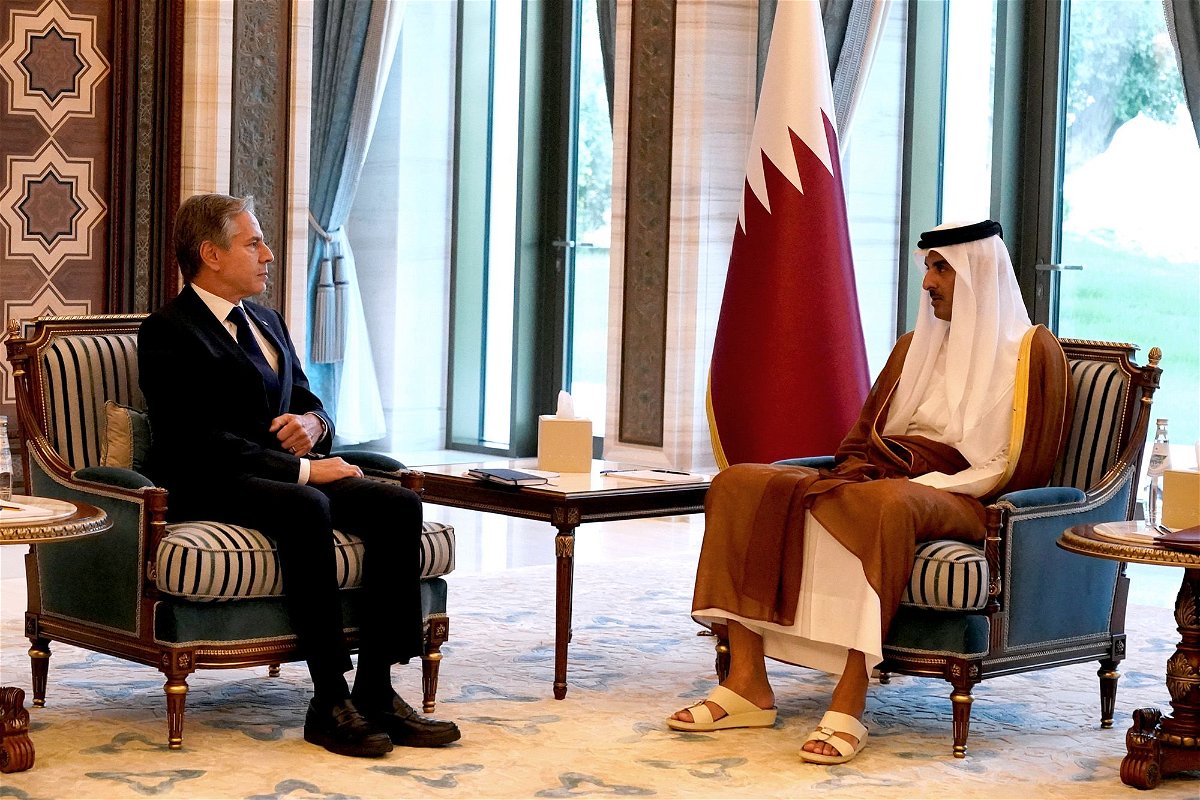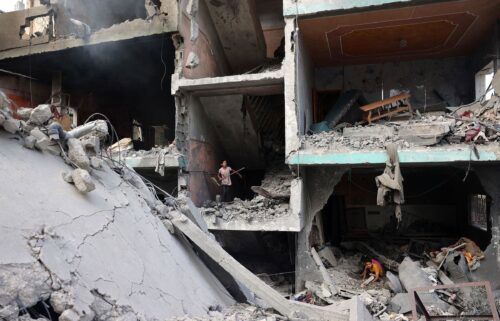How the tiny Arab state of Qatar became indispensable in talks with Hamas

Secretary of State Antony Blinken and Qatari Emir Sheikh Tamim bin Hamad Al Thani attend a meeting in Lusail
Abu Dhabi, UAE (CNN) — The small Persian Gulf state of Qatar is once again front and center in global diplomacy, this time for its efforts to mediate deals to free hostages taken by Hamas during its October 7 attacks in Israel, as well as evacuate foreign nationals from Gaza.
On Wednesday, Qatar brokered a deal between Israel, Hamas and Egypt, in coordination with the United States, to release foreign nationals and critically injured Palestinian civilians from Gaza to Egypt, according to sources familiar with the talks. The agreement was separate from any hostage negotiations, the source added.
At least 110 foreign passport holders left Gaza, according to officials on the Palestinian side of the Rafah border crossing. Al-Arish Hospital in Egypt also began receiving injured Palestinians who crossed from Gaza, according to Al-Qahera news.
Qatar finds itself in a delicate diplomatic position, one that experts say has so far acted in its benefit, making it an indispensable ally to Washington. But some have said that Qatar’s relationship with Hamas may become a liability.
“(Qatar’s) relationship with Hamas has been a key component of the mediation strategy,” said Andreas Krieg, an associate professor at King’s College London who focuses on Gulf states. “It’s a place where Qatar has a monopoly over that relationship, has a monopoly over that conflict because it can speak to both sides in a way that no other player in the world can.”
The gas-rich monarchy has maintained a relationship with Hamas while being one of the US’ closest allies in the region. Meanwhile, it has also kept back-channel contacts with Israel. David Barnea, head of Israel’s intelligence agency Mossad, was in Qatar over the weekend to discuss efforts to get hostages released, three sources familiar with the talks told CNN.
For now, the Hamas-Qatar relationship appears to be paying off. In addition to the Palestinian civilians and foreign nationals allowed to leave Gaza on Wednesday, four hostages held by Hamas – two Israelis and two American-Israelis – have also been freed through Qatari and Egyptian mediation.
Israel has acknowledged Qatar’s efforts, with National Security Adviser Tzachi Hanegbi saying the Gulf state has become “an essential party and stakeholder in the facilitation of humanitarian solutions.”
“Qatar’s diplomatic efforts are crucial at this time,” Hanegbi wrote on X, formerly Twitter.
What is the nature of Qatar’s relationship with Hamas?
In the wake of the 2011 Arab Spring uprisings, Qatar fell out with some of its Arab neighbors after it supported the protesters that sought to overthrow the regimes in several Arab nations.
Ties further deteriorated when Saudi Arabia, Bahrain, the United Arab Emirates and Egypt severed diplomatic ties with Qatar in mid-2017, accusing the country of supporting terrorism, which Qatar repeatedly denied. It took years for the countries to patch up relations.
In 2012, it allowed Iran-backed Hamas to establish a political office in Doha, which remains operative.
That relationship has made Qatar an important mediator with Hamas during its conflicts with Israel.
Qatar also pays public sector salaries in Gaza, part of a $30 million per month stipend for families and fuel for electricity, according to Reuters.
It has maintained close relations with Western nations, becoming an increasingly important energy supplier as one of the world’s biggest gas producers and is a major arms buyer from the US. It has for decades been home to a giant US air base and was declared a Major Non-NATO Ally by the Biden administration last year.
But Doha was also one of the first Gulf Arab nations to establish diplomatic relations with Israel, in 1996, breaking a long-held taboo in the region (it severed ties after Israel invaded Gaza in 2009). Its Al Jazeera network was the first pan-Arab news network to label Israel on a map and invite its officials for on-air interviews.
What is Qatar’s strategy in playing a mediator role?
Qatar is trying to “carve out a place for diplomacy,” Krieg said, adding that one goal was to delay an Israeli offensive inside Gaza. Israel however launched the start of its full ground operation on Friday, which US officials told CNN has complicated efforts to free the more than 200 hostages believed to be held by Hamas.
On Saturday, Majed Al-Ansari, the spokesperson for Qatar’s Ministry of Foreign Affairs told CNN that hostage negotiations are becoming more difficult but are ongoing despite the escalation on the ground.
Mediating to release the hostages kidnapped by Hamas is a useful avenue for Qatari diplomacy, Krieg added, as some of the hostages have European and American nationalities, giving several countries a vested interest in backing Doha’s efforts.
Mediation has long been one of Qatar’s most “marketable skills,” said Joost R. Hiltermann, director of the Middle East North Africa program at the International Crisis Group think tank in Brussels, referring to the Gulf state’s long history of negotiating between international players at odds with one another.
Doha mediated a landmark deal between Iran and the US in September, which saw the release of five Americans from Iranian detention. The prisoner release was part of a wider deal that included the US unfreezing $6 billion in Iranian funds.
Qatar also played mediating roles on Iran’s nuclear file, facilitating indirect talks between Tehran and Washington in late 2022.
In one of its most notable mediation efforts, Qatar in 2021 proved crucial to Washington’s eleventh-hour evacuation from Afghanistan, when the Gulf state not only facilitated the safe travel of Americans in the country, but also acted as a protecting power for them in the new Taliban-ruled state, with which Qatar maintains diplomatic ties.
Has Hamas become a liability for Qatar after October 7?
Doha has come under criticism from Israel and Western politicians for its ties with Hamas.
Despite its mediation efforts, Israeli Foreign Minister Eli Cohen last week accused Qatar of financing Hamas and harboring its leaders.
“Qatar, which finance and harbor of Hamas’ leaders, could influence and enable the immediate and unconditional release of all, of all hostages held by the terrorists. You, members of the international community should demand Qatar to do just that,” Cohen said at a high-level UN meeting.
In response, Qatar said it was “surprised and dismayed” by the Israeli minister’s comments, especially “at a time when Qatar is seeking to ensure the release of captives and de-escalation.”
Qatar warned that “these provocative statements” could undermine mediation efforts and even “endanger lives.”
Krieg said that a lot of Qataris privately have their own reservations about Hamas, and that Qatar’s relationship with Hamas likely “needs a bit of a reality check.”
The Washington Post reported on Thursday that the US and Qatar have “agreed to revisit” Doha’s association with Hamas after the hostage crisis is resolved, citing four diplomats familiar with the discussions.
The agreement was forged during a recent meeting in Doha between US Secretary of State Antony Blinken and the emir of Qatar, the Washington Post said, adding it is still undecided whether that reevaluation “will entail an exodus of Hamas leaders from Qatar.”
Krieg said it is unlikely that Qatar will kick Hamas out, but is likely to dissociate from the group, as it did with the Taliban, which also an office in the Qatari capital Doha.
“Qatar is playing an exemplary role” in its mediation efforts, Hiltermann said. “But there is a political bloc in the US that is unhappy with Qatar’s coziness with Hamas.”
Two Republican members of Congress have called on Qatar to “extradite Hamas’s leadership from Doha.”
Hiltermann said that despite the pressure on Qatar to push out Hamas, letting go of the group would be “a self-defeating move” for Qatar and might push Hamas further into Iran’s arms.
“You’ll lose that contact,” he said. “And these contacts can be useful in the future.”
Israel has however said that it seeks to destroy Hamas once and for all so that it doesn’t threaten it again, which could diminish Qatar’s utility as a mediator.
CNN’s Becky Anderson in Doha, Ibrahim Dahman in Gaza, Hamdi Alkhshali in Atlanta and Aimee Look in Abu Dhabi contributed to this report.
The-CNN-Wire
™ & © 2023 Cable News Network, Inc., a Warner Bros. Discovery Company. All rights reserved.



